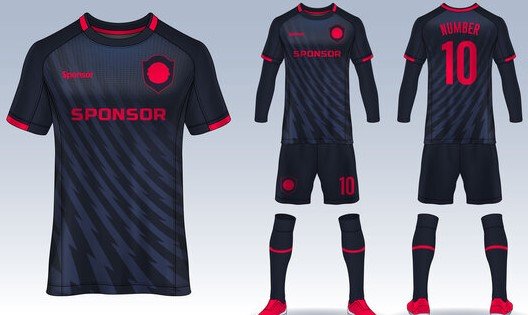In a surprising twist for global soccer, a small British company named PlayerLayer has stepped up to outfit the Marshall Islands’ first national soccer team with custom jerseys in 2025. This partnership highlights how a modest business from Nottingham, England, beat out big brands to support a tiny Pacific nation facing climate threats, marking a key moment in the team’s push for international recognition.
The Rise of Marshall Islands Soccer
The Marshall Islands, a remote archipelago in the Pacific Ocean with about 42,000 residents, launched its soccer federation in late 2020. For years, the nation lacked a national team, making it one of the last sovereign countries without one, largely due to its isolation and focus on sports like basketball influenced by past U.S. ties.
This changed when passionate locals and supporters formed the Marshall Islands Soccer Federation. They built a 2,000-seat stadium in Majuro and started training players. The team’s first matches happened in early 2025, including a debut loss to the U.S. Virgin Islands and a close game against Turks and Caicos, where they scored their initial goals.

By mid-2025, the federation gained traction by hosting events like the Outrigger Challenge Cup, drawing attention to their efforts. This growth ties into broader goals, such as seeking membership in the Oceania Football Confederation and eventually FIFA, despite challenges from rising sea levels that threaten the islands’ existence.
How PlayerLayer Entered the Picture
PlayerLayer, founded in 2008 in Nottingham, started by making kits for university sports teams across the UK. The company focuses on sustainable, durable apparel, using materials like recycled plastic and organic cotton to create eco-friendly products.
The connection to the Marshall Islands began through a university student who followed the federation’s story. Initial talks led to a sponsorship deal, where PlayerLayer designed and produced the team’s first official jerseys. This move came at a time when major brands like Adidas or Nike showed no interest, allowing the smaller firm to shine on a global stage.
PlayerLayer’s involvement goes beyond kits. They provide training gear and support for events, helping the team build its identity. Company leaders say this partnership aligns with their values of supporting underrepresented groups in sports.
The deal has boosted PlayerLayer’s visibility. Sales of the Marshall Islands jerseys spiked after the 2025 launch, with fans worldwide buying them to show solidarity. This success shows how niche businesses can compete in the massive soccer apparel market, valued at over $7 billion globally in 2025.
Jersey Design and Climate Message
The jerseys stand out for their unique design and purpose. Created by Argentine designer Micael Altarimano, they feature a blend of cultural symbols from the Marshall Islands, like ocean waves and traditional patterns, printed on sustainable fabric.
A special edition called the “No Home Jersey” uses innovative materials that fade over time, symbolizing the threat of rising seas due to climate change. This design aims to raise awareness, as the islands could become uninhabitable by 2030 if trends continue.
Key features of the jerseys include:
- Made from recycled plastic, organic cotton, and bamboo charcoal for breathability and eco-friendliness.
- Fitted styles for players, with looser options for fans.
- Available in home and away versions, priced around $80 to $100.
These elements make the kits more than just uniforms; they serve as a call to action on environmental issues.
Team’s First Matches and Challenges
In February 2025, the Marshall Islands team played its inaugural games in Arkansas, USA. They lost 7-0 to the U.S. Virgin Islands but bounced back with a 3-2 defeat to Turks and Caicos, scoring twice.
Looking ahead, the 2025 Outrigger Challenge Cup featured more matches, with live streams reaching global audiences. The federation called up players from local leagues and diaspora communities for these events.
Challenges remain, including limited funding and the lack of FIFA recognition. Climate change adds urgency, as rising waters could submerge parts of the islands, displacing residents and disrupting sports infrastructure.
Despite this, the team inspires hope. Supporters point to similar stories, like Bhutan’s soccer rise, as models for success.
Impact on Global Soccer and Business
This partnership shows how small businesses can influence international sports. PlayerLayer’s sales grew by 25% in 2025, partly from the Marshall Islands buzz, proving that ethical, targeted sponsorships pay off.
For the Marshall Islands, the jerseys boost national pride and draw attention to their plight. Sales fund federation programs, including youth training.
The story ties into trends like sustainable fashion in sports. Major leagues now push eco-kits, but PlayerLayer’s grassroots approach sets a new standard.
Here’s a quick look at key milestones:
| Year | Event | Details |
|---|---|---|
| 2020 | Federation Founded | Marshall Islands Soccer Federation established as the last nation without a team. |
| 2023 | First Kit Design Contest | Over 150 global submissions; winner announced. |
| 2025 | Debut Matches | First games played; jerseys launched with PlayerLayer. |
| 2025 | Outrigger Cup | Hosted with sponsorships and live streams. |
This table captures the timeline of progress.
Future Prospects and Broader Lessons
Experts predict the team could join regional confederations by 2027 if they build more infrastructure. PlayerLayer plans to expand the line with new designs, including fan merchandise.
This tale reminds us that soccer unites people, even in remote places. It also highlights climate action’s role in sports, with events like COP30 in 2025 discussing similar issues.
What do you think about this underdog story? Share your thoughts in the comments and spread the word to support small nations in sports.








